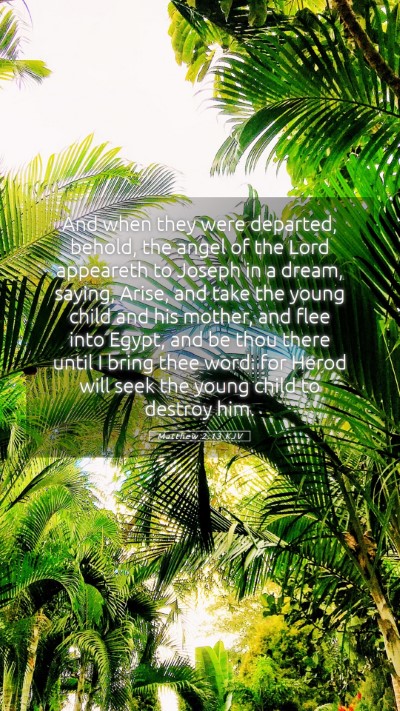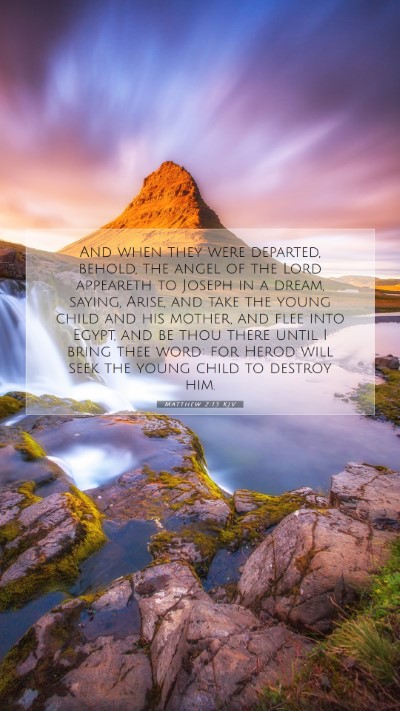Understanding Matthew 2:13
Bible Verse: Matthew 2:13
When we delve into the meaning of Matthew 2:13, we uncover significant insights into the protective nature of God and the fulfillment of prophetic declarations regarding Jesus’ early life. This passage offers profound bible verse explanations and serves as a cornerstone for understanding God’s providential care.
Text of the Verse
In this passage, it is written: “Now when they had departed, behold, an angel of the Lord appeared to Joseph in a dream, saying, ‘Arise, take the young Child and His mother, flee to Egypt, and stay there until I bring you word; for Herod will seek the young Child to destroy Him.’” (Matthew 2:13, NKJV)
Key Themes and Insights
-
Divine Intervention
Matthew Henry states that this verse illustrates the mercy and preparedness of God. God intervened in a moment of danger to provide guidance and protect His Son from Herod’s malicious intent. This reflects God’s overarching plan for Jesus’ life, highlighting how divine intervention often comes at critical moments.
-
Fulfillment of Prophecy
Albert Barnes emphasizes that the flight to Egypt connects with Old Testament prophecies, particularly Hosea 11:1, which speaks of God calling His son from Egypt. This emphasizes the prophetic nature of Jesus’ life and mission, reaffirming His role as the Messiah.
-
Protection of the Holy Family
Adam Clarke points out that the directive given to Joseph demonstrates God’s care not only for His Son but also for Mary. It reminds readers of the sanctity and importance of family, especially under divine guidance. Protection in perilous times is a recurring theme in scriptural narratives.
-
Response to Threat
This verse reflects Joseph’s immediate obedience to God’s command, a vital aspect of biblical faith and devotion. His readiness to act demonstrates how Bible verse interpretations often highlight the principle of faith translating into swift action, as noted by both Henry and Clarke.
-
Symbolism of Egypt
Egypt often symbolizes both refuge and oppression in biblical texts. In this instance, it serves as a temporary refuge for the Holy Family, showcasing how God can use even challenging circumstances for His purposes. This deepens our understanding of Scripture, particularly how places and events carry significant meanings.
Cross References
This verse can be connected to several other passages that enrich its understanding:
- Hosea 11:1 - "When Israel was a child, I loved him, and out of Egypt, I called my son."
- Exodus 4:19 - God's command to Moses regarding his return to Egypt, echoing themes of divine purpose and safety.
- Luke 2:22-40 - Further narrative about Jesus’ childhood and the protective measures taken for his safety.
Application to Life
This passage encourages believers to trust in God's guidance, especially in times of uncertainty. Bible study lessons derived from this verse can focus on active response to divine direction. It reminds believers that God's plans often involve elements they may not understand but are ultimately for their protection and purpose.
In conclusion, Matthew 2:13 encapsulates key themes of divine protection, obedience, and fulfillment of prophecy. This analysis invites further bible study insights and reflection, urging individuals to engage deeply with Scripture and recognize God’s providence in their own lives.
Learn More
For those seeking to deepen their Bible study understanding, consider exploring online Bible study resources or developing a study plan that includes the examination of prophetic literature and the significance of dreams in biblical narratives.


